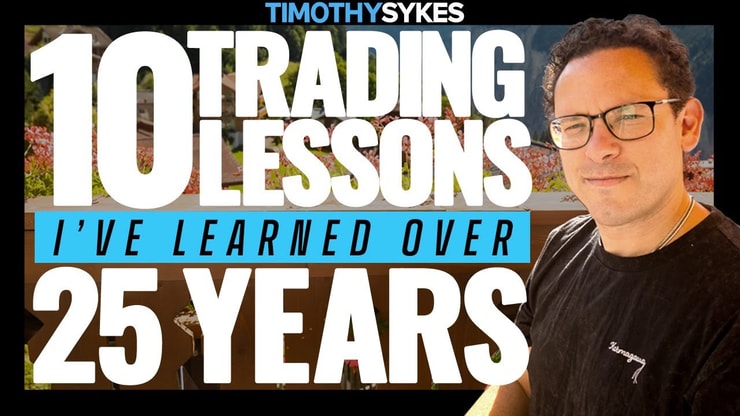Stock market courses in Canada can give you the foundation every trader needs — especially if you’re new. Instead of diving into the markets blind, you’ll learn how trades work, how to build a strategy, and how to avoid the rookie mistakes that cost people money fast. Whether you’re interested in day trading, long-term investing, or just learning to manage your money smarter — the right course can cut your learning curve in half.
This guide will help you find the best stock market courses in Canada based on your goals, trading experience, and learning style — whether you’re looking for free online options or full training programs that go deep on strategy and execution.
I’ll answer the following questions:
- What are stock market courses?
- Why is financial education important for successful investing?
- How can stock market courses give you an edge in the investment world?
- What basics of stock trading do beginners need to understand?
- What is the role of technical and fundamental analysis in stock trading?
- Why is portfolio management significant in trading?
- What are the top institutions offering courses on the Canadian stock market?
- How do I choose the right stock market course for me?
Let’s get to the content!
Table of Contents
- 1 What Are Stock Market Courses?
- 2 Beginner Guide to Stock Market Education in Canada
- 3 Top Institutions Offering Courses on the Canadian Stock Market
- 4 Best Online Stock Trading Courses for Canada for 2025
- 5 Key Takeaways
- 6 Frequently Asked Questions
- 6.1 How Do I Choose the Right Stock Market Course for Me?
- 6.2 Are Online Stock Market Courses as Effective as In-Person Classes?
- 6.3 What Are the Prerequisites for Enrolling in Advanced Stock Market Courses?
- 6.4 What Are the Key Features of Stock Market Courses in Ontario, Canada?
- 6.5 How Do Stock Market Courses in Canada Differ in Content and Approach?
- 6.6 What Services and Products Do Canadian Stock Market Courses Offer?
- 6.7 What Should You Look for in a Stock Market Course in Toronto?
- 6.8 Are There Any Online Stock Market Courses Offered by Tech Giants?
- 6.9 What Are the Requirements and Fees for CFA Courses in Canada?
- 6.10 How Do Canadian Companies Benefit from Employees Attending Stock Market Courses?
- 6.11 What Are the Key Purposes of Providing Links to Stock Market Course Pages?
What Are Stock Market Courses?
Stock market courses are structured programs designed to teach you how the markets work — from placing your first trade to managing a full portfolio. They cover everything from technical analysis and chart reading to portfolio management and psychology. The best ones focus on real-world trading — not just textbook theory.
The Importance of Financial Education
If you don’t understand how the markets work, you’re gambling — not trading. Financial education helps you decode charts, read company filings, and manage risk like a professional. It’s not about “knowing everything.” It’s about knowing enough to make smart, strategic decisions when it counts.
Gaining an Edge in the Investment World
The edge in today’s market isn’t just information — it’s how fast and how well you process it. A quality stock market course teaches you how to think like a trader, spot setups, manage risk, and react fast when opportunity hits. That’s how you get ahead — not by guessing, but by preparing.
Beginner Guide to Stock Market Education in Canada
For those new to the stock market, beginning with a solid educational foundation is key. Canadian stock market courses for beginners focus on imparting a strong understanding of the basics, such as the different types of stocks, bonds, ETFs, and mutual funds, and how they fit into a well-rounded investment portfolio.
From there, focus on risk management, position sizing, and trade execution. The right beginner course will teach you how to stay in the game — not just how to get in.
Learning stock market hours should be your first step. Discover more about trading during the Canadian market hours and how it can complement your penny stock trading strategies by visiting Stock Market Open in Canada: What to Know.
More Breaking News
- PLTR’s AI Surge: Examining Major Deal Moves
- ClearOne’s Financial Maneuver: One-Time Dividend Sparks Investor Interest
- BitMine Stock Receives Boost as Expansion Plans Unfold
Understanding the Basics of Stock Trading
You don’t need to know everything to start — but you do need to understand the core mechanics. What is a stock? How do market orders work? What’s the difference between a breakout and a breakdown? Good beginner courses break these ideas down in plain English, so you’re not overwhelmed when you pull up your first chart.
You can’t trade when the market’s on vacation. Market holidays can affect liquidity and volatility, leading to unique trading opportunities or risks. For traders who want to stay ahead of the game and plan their strategies around these key dates, it’s essential to be informed about the stock market holidays in Canada. Learn more about these important dates and how they can impact your trading by checking out Stock Market Holidays Canada: Important Dates to Know.
The Role of Technical and Fundamental Analysis
Technical analysis helps you time trades. Fundamental analysis helps you pick the right stocks. Both have their place.
Strong courses teach you how to read price action, analyze earnings reports, and spot red flags before the crowd. This is how real traders build conviction — not just by reading headlines.
The Significance of Portfolio Management
Good trading isn’t just about entries — it’s about managing your money. Portfolio management means knowing when to hold, when to cut, and how to size your positions based on risk. Smart courses will show you how to avoid overexposure and build a portfolio that fits your goals — not your emotions.
Leveraging the right tools can also make a big difference in your portfolio management. One such tool is the Yahoo Finance portfolio, especially for traders in Canada. It offers comprehensive market data, news, and portfolio management features that can aid in making informed trading decisions. Gain insights into utilizing this tool effectively by visiting Yahoo Finance Portfolio in Canada: Things to Know.
Top Institutions Offering Courses on the Canadian Stock Market
From universities to online platforms, Canada offers a range of stock market courses — but not all of them are built for traders. Some are academic. Others are hands-on. If you’re looking to actively trade or learn specific setups, focus on programs that offer direct market experience, not just theory.
Best Online Stock Trading Courses for Canada for 2025
Here are my online stock trading course picks:
- Best Comprehensive Offering: Daily Income Trader
- Best for Day Trading Penny Stocks: The Tim Sykes Trading Challenge
- Best Value: Bullish Bears
- Best for Educational Content: Udemy
- Best for Day Trading Forex: Asia Forex Mentor — One Core Program
As we look ahead to 2025, the landscape of online stock trading courses continues to evolve. The best courses will offer up-to-date content on the latest trading strategies, investment tools, and financial planning techniques. They will also integrate practical examples and interactive learning to ensure students can apply their knowledge in real-world scenarios.
The market is flooded with day trading courses, but not all are created equal. Here are some of the best:
Best Comprehensive Offering: Daily Income Trader
StocksToTrade’s Daily Income Trader program offers a wide range of topics and has something for everyone, from beginners to experienced traders. It’s a well-rounded program that covers everything from basics to advanced strategies.
Daily Income Trader gives you access to all of the following:
- Premarket Prep with StocksToTrade lead trainer Tim Bohen
- Bryce Tuohey from Small Cap Rockets giving a market open webinar each day
- Tim Bohen back at noon with his afternoon Double Down review
- Small Cap Rockets’ Matt Monaco in the after-hours sharing his game plan for the next trading day
You get access to StocksToTrade, the subscriber-only trading rooms Breaking News and Small Cap Rockets, the Discord chat, 600-plus webinars, and more…
Daily Income Trader is your key to unlocking the market — check out the webinar here!
Best for Day Trading Penny Stocks: The Tim Sykes Trading Challenge
The Trading Challenge is based on my 20+ years of experience as a penny stock trader. During that time, I’ve made over $7.9 million, mostly trading penny stocks.
That isn’t what I’m most proud of. I’m even more proud that I’ve helped turn over 30 of my Trading Challenge students into millionaire traders.
I didn’t do this by giving them hot stock picks. I did it by being relentlessly honest about my successes and failures and teaching them to be that way, too.
The Challenge has everything you need to learn my top strategies:
- Interactive webinars with me and my top students
- A library of more than 9,000 video lessons
- Access to the legendary Challenge chat room
- And more!
Are you ready for this level of honesty?
Apply to my Trading Challenge here.
Best Value: Bullish Bears
Bullish Bears offers low-cost access to educational content, chat rooms, and video lessons. It’s best for beginners on a tight budget who want to get their feet wet with live examples and screen-share sessions. Less structured than some programs, but a solid value.
Best for Educational Content: Udemy
If you want flexibility, Udemy has a library of beginner-friendly courses on everything from candlestick patterns to trading psychology. These are standalone lessons — not interactive programs — but great if you’re just starting and want to learn at your own pace.
Best for Day Trading Forex: Asia Forex Mentor — One Core Program
One Core Program is geared toward forex traders. It dives into risk-to-reward setups, entry/exit signals, and managing trades across different currency pairs. A good pick if you’re specifically focused on forex, not equities.
Key Takeaways
Stock market courses in Canada can be a game-changer — but only if they’re built for real traders. Look for programs that teach risk management, pattern recognition, and how to build a trading plan that fits your goals.
Education isn’t about getting rich fast — it’s about staying in the game long enough to build real skill.
Trading isn’t rocket science. It’s a skill you build and work on like any other, one where the details matter more than the money you make — although that’s a pretty awesome bonus. Trading has changed my life, and I think this way of life should be open to more people…
I’ve built my Trading Challenge to pass on the things I had to learn for myself. It’s the kind of community that I wish I had when I was starting out.
We don’t accept everyone. If you’re up for the challenge — I want to hear from you.
Apply to the Trading Challenge here.
Trading is a battlefield. The more knowledge you have, the better prepared you’ll be.
What are YOU looking to learn in a stock market course? Let me know in the comments — I love hearing from my readers!
Frequently Asked Questions
How Do I Choose the Right Stock Market Course for Me?
Choosing the right stock market course involves assessing your current level of knowledge, your learning objectives, and the format that best suits your lifestyle. Look for courses that offer a comprehensive curriculum that covers the basics of stock trading, investment strategies, and risk management.
Are Online Stock Market Courses as Effective as In-Person Classes?
Online stock market courses can be just as effective as in-person classes, provided they offer interactive content, access to experienced instructors, and practical learning opportunities. The key is to find a course that offers a balance of theoretical knowledge and practical application.
What Are the Prerequisites for Enrolling in Advanced Stock Market Courses?
Advanced stock market courses typically require a basic understanding of stock trading, fundamental and technical analysis, and portfolio management. Some may also require familiarity with financial planning, economics, accounting, and tax considerations.
What Are the Key Features of Stock Market Courses in Ontario, Canada?
Stock market courses in Ontario often focus on investments, shares, and options trading. They provide a detailed description of various investment strategies, along with credible sources of information. These courses also offer investment advice, ensuring clients understand the complexities of the financial market.
How Do Stock Market Courses in Canada Differ in Content and Approach?
In Canada, stock market courses vary in content and approach. While some focus on basic skills and confidence-building for beginners, others cater to professionals seeking advanced training. These courses also differ in their emphasis on specific areas like options trading or investment analysis.
What Services and Products Do Canadian Stock Market Courses Offer?
Canadian stock market courses often combine services like personalized training with products such as detailed course materials. These courses aim to enhance clients’ expertise in business and finances, often incorporating real-world case studies and simulation exercises.
What Should You Look for in a Stock Market Course in Toronto?
When choosing a stock market course in Toronto, consider the firm’s reputation, the expertise of the professionals teaching the course, and the legal aspects covered. Look for courses that offer certifications and focus on practical skills like English writing and analysis using tools like Microsoft Excel and Google Sheets.
Are There Any Online Stock Market Courses Offered by Tech Giants?
Yes, tech giants like Microsoft and Google often offer online courses related to the stock market. These courses might cover using their tools for financial analysis and may be available on platforms like Instagram for wider accessibility. They focus on building confidence and performance analysis skills.
What Are the Requirements and Fees for CFA Courses in Canada?
The Chartered Financial Analyst (CFA) courses in Canada have specific requirements, including a certain level of education and understanding of the English language. The fees for these courses can vary depending on the institution and the level of the program. It’s important to check the course page for detailed fee structures and to understand the financial commitment involved.
How Do Canadian Companies Benefit from Employees Attending Stock Market Courses?
Canadian companies benefit significantly when their employees attend stock market courses. These courses provide employees with detailed knowledge about managing company finances and making informed investment decisions. Additionally, understanding the nuances of the stock market can aid companies in making strategic financial choices that positively impact their bottom line.
What Are the Key Purposes of Providing Links to Stock Market Course Pages?
Providing links to stock market course pages serves several purposes. It allows potential students to access detailed information about course content, location, tuition fees, and language requirements. These links often lead to pages where experts share insights, offering a glimpse into the course’s depth and expertise. This transparency is crucial for students to make informed decisions about enrolling in a course.











Leave a reply